How it works for allergic itching drugs
Allergy itching medication works to relieve symptoms. When you eat or come in contact with allergens (allergens) that are actually harmless, histamine produced by the immune system will overreact. Histamine also commands the body to fight allergens. This is what causes allergic reactions or symptoms, namely the skin, nose and eyes feel itchy.

To relieve symptoms of allergies, itching drugs work to stop or limit the activity of histamine in the body. However, allergic itching drugs cannot be used to prevent allergic reactions or treat severe allergic reactions such as anaphylactics.
Antihistamine itching allergy medicine
If your allergy is recurrent, there are currently many medicines to treat allergic itching that can be purchased without a doctor's prescription. The following are the most common types of allergic itching drugs.
- Cetirizine
Cetirizine is the generic name of a second generation antihistamine drug. This drug can fight the symptoms of allergies without causing drowsiness. Cetirizine is available as tablets, syrups and drops. Like most other second-generation antihistamines, this drug only needs to be taken once a day or according to the dosage recommended by your doctor or pharmacist.
- Loratadine
This itchy drug is similar to cetirizine. Loratadine is also a second-generation antihistamine drug that does not cause drowsiness and is enough to be taken once a day.
Various studies have revealed that cetirizine and loratadine are equally effective in dealing with allergic symptoms, namely itching. However, for a faster antihistamine effect, cetirizine is still superior to loratadine.
- Fexofenadine
Compared to other second-generation antihistamines, fexofenadine is the least of its side effects. According to various surveys conducted by experts, some people still feel sleepy after taking cetirizine or loratadine.
Meanwhile, fexofenadine at least causes drowsiness. However, according to a 2001 study, cetirizine and loratadine were still faster at stopping histamine.
- Diphenhydramine
Unlike other itching drugs, diphenhydramine is a first generation antihistamine drug. So, this drug causes drowsiness and weakness. If you want to take this medicine, make sure you are not driving or operating the machine.
Corticosteroid allergy medicine
Corticosteroids or steroids are drugs to treat itching caused by inflammation due to allergies. There are three types of corticosteroid drugs, namely topical (topical), oral (drinking), and intravenous (injection).
Topical corticosteroids or topical creams work quickly to reduce inflammation and swelling in the skin that occurs due to allergic reactions. Mild corticosteroids such as hydrocortisone can be purchased without a prescription at a pharmacy.
If itching and rash does not improve after 7 days of applying a topical medication or getting worse, consult a doctor. Chances are the doctor will prescribe a steroid cream drug that is harder in the womb.
However, this drug must be used with caution, referring to the rules of use and the correct dosage according to rese. Because the side effects of these hard drugs can make skin become problematic as stretch marks arise.
In addition to topical corticosteroid drugs, there are also allergic drugs that are injected or given by mouth (systemic). This drug will generally be able to relieve itching and swelling in a short time. However, this medication is only prescribed by a doctor with a note that if itching is allergic to cause severe rashes, swelling, and also spread throughout your body.
Also, be aware that this systemic steroid drug is only used short-term. This drug can also have significant side effects and need to be monitored for use by a doctor. Some of the side effects that can occur include weight gain, bone thinning, cataracts, glaucoma, easy bruising and sleep disorders.
- Calamine lotion
Calamine is an allergic itching drug that works by producing a cold sensation when applied to inflamed skin. You can get this itchy drug at a pharmacy or by prescription. Use this itch exactly as directed on the label or as prescribed by your doctor. Do not use more, less or longer amounts than the doctor recommends.
Before you apply topical calamine, wash the itchy skin with soap and water. After that, let the skin dry first. Shake the calamine bottle before use then rub it on the itchy skin. When applying calamine directly to the skin, rub it gently. Then, let it dry on your skin. You can also use cotton balls to apply this medicine to your skin. Wash your hands with soap and water after applying this allergy medicine.
Calamine lotion can leave thin residue on the skin when it dries. You can cover the itchy area and smear it with loose clothing, but calamine can stain the clothes you wear. Contact your doctor if symptoms do not improve after 7 days of itching allergy medicine used. Store at room temperature away from moisture and heat. Do not put it in the refrigerator.
When to see a doctor?
Generally after taking medication or applying the medicine to the skin, itchiness of allergic symptoms will improve. Rashes and itching will generally disappear within a week. Most skin allergies are not life-threatening. But in rare cases, a severe reaction called anaphylaxis may occur. Contact the hospital or 118 if you have allergic itching accompanied by the following symptoms:
- Difficulty breathing
- A feeling of tightness in the throat
- Hoarseness or difficulty speaking
- Swollen lips, tongue or throat
- Nausea, stomach ache, or vomiting
- Fast heartbeat
- Anxiety or dizziness
- Lost consciousness




